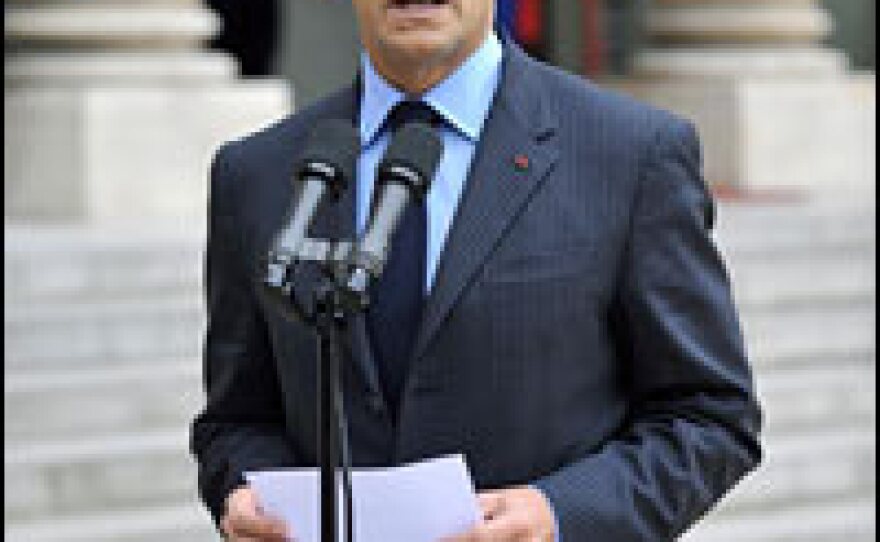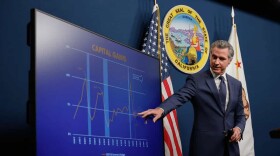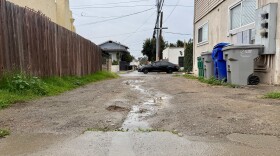
The financial turmoil that has shaken Wall Street is also taking its toll in Europe, where governments moved to assure bank depositors that their money is safe, and a massive bailout was announced for a large German lender. But European leaders are struggling to deliver a unified response to the crisis.
During the weekend, rumors that Germany's fourth-largest bank was about to go under dominated the country's news coverage. But on Sunday, the German government, the central bank and private banks agreed on a $68 billion rescue plan for troubled bank Hypo Real Estate. At the same time, the German government said it would guarantee all private bank accounts.
German Chancellor Angela Merkel spoke to reassure the country.
"I am telling all citizens with savings that their deposits are safe," Merkel said. "The federal government will guarantee that."
Just last week, Greece and Ireland made the same blanket guarantees — the only other European countries to do so. At the time, Merkel criticized Ireland's unilateral move. So did neighboring Britain, where some depositors actually moved their savings to Irish banks.
On Saturday, French President Nicolas Sarkozy gathered the leaders of Europe's four largest economies for a meeting in Paris to try to coordinate a response to the crisis. The leaders of France, Germany, Britain and Italy pledged to work together to halt the financial crisis and a Lehman Brothers-type bankruptcy in Europe. And they called for a world summit on the crisis to be held as soon as possible. Sarkozy said European values must help shape a new financial order.
"It is important that Europe fight for its ideas and values to help bring back confidence," Sarkozy said. "We want capitalism based on entrepreneurs and not speculators. We want morality and transparency. The world needs Europe to show its stability."
Some analysts hailed the weekend's powerful message of returning morality to capitalism, while others dismissed the summit as too little too late. The exclusivity of the meeting irritated European Union leaders who were not invited, like Europe's fifth-largest economy, Spain.
But despite having shared a single market with one currency for nearly a decade, the euro zone has never established the polticial and regulatory integration that would allow it to face a crisis of such proportions as one.
A Message Of Unity
French political analyst Anne-Elisabeth Moutet says sending a message of unity was about the best the leaders could do.
"I didn't expect them to really sort of take concrete measures, if only because no matter what [European Central Bank President Jean-Claude Trichet] says ... they're 27 separate countries and 27 separate budgets and they each will do something slightly different according to how much in debt they are."
That debt turned out to be too much for Belgium. Late Sunday night, in one of the most complicated and spectacular cross-border bank rescues, French bank BNP Paribas took control of the Belgian and Luxembourg businesses of troubled bank Fortis. On Friday, the Netherlands nationalized Fortis's Dutch operations, throwing the Belgian government into a weekend of crisis meetings and causing bitterness between the two Benelux neighbors.
Also this weekend, the government of Iceland discussed selling some of its assets overseas to bring money home to shore up its banks.
Election Seen Hampering U.S. Response
Phillippe Dessertine, head of the Paris-based Institute of High Finance, says Europe must coordinate its responses and remain united if it is to provide global leadership on the crisis at a time when America is looking inward.
"We are in a very tough period because of the election in the U.S. It means that there must be another alternative, for instance, for the question of financial crisis, and Europe maybe has to propose some advantages that, for instance, the United States, today, cannot offer," Dessertine says.
Merkel's go-it-alone decision to guarantee bank deposits has created fissures in the European show of unity. The pressure will be on EU finance ministers to repair the damage as they work this week in Luxembourg to hammer out the details of the weekend agreement.
Copyright 2022 NPR. To see more, visit https://www.npr.org. 9(MDAzMjM2NDYzMDEyMzc1Njk5NjAxNzY3OQ001))






